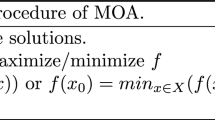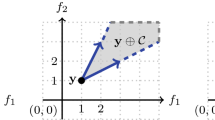Abstract
To solve unconstrained optimization problems, a random search differential evolution algorithm (RPMDE) is designed based on a modified differential evolution algorithm. The efficiency of an evolutionary algorithm usually depends on its exploration competence and development capability. Considering these characteristics, an effective difference operator called ‘DE/M_pBest-best/1’ is designed, which originates from ‘DE/best/1/’ and ‘DE/current-pbest/1’. The operator makes use of information from the best population of individuals to generate new solutions for the development of RPMDE and guarantee swarm quality during the later evolution of the algorithm, which improves its searching ability. To prevent the solutions from falling into local optima, RPMDE also adopts random perturbation to update the current solution with a better solution after difference mutation and crossover are competed. Furthermore, a levy distribution is employed to adjust the scale factor as a control parameter. All designed operators are beneficial to improve the exploration competence and the diversity of the whole population. Last, a large number of computational experiments and comparisons are conducted by employing 15 benchmark functions. The experimental results indicate that the designed algorithm, RPMDE, is more effective than other differential evolution variants in dealing with unconstrained optimization problems.

Similar content being viewed by others
References
Angira R, Santosh A (2007) Optimization of dynamic systems: a trigonometric differential evolution approach. Comput Chem Eng 31(9):1055–1063
Baatar N, Zhang D, Koh CS (2013) An improved differential evolution algorithm adopting lambda—best mutation strategy for global optimization of electromagnetic devices. IEEE Trans Magn 49(5):2097–2100
Balaji G, Balamurugan R, Lakshminarasimman L (2016) Mathematical approach assisted differential evolution for generator maintenance scheduling. Int J Elec Power 82:508–518
Basu M (2016) Quasi-oppositional differential evolution for optimal reactive power dispatch. Int J Electr Power 78:29–40
Brest J, Greiner S, Bošković B, Mernik M, Žumer V (2006) Self-adapting control parameters in differential evolution: a comparative study on numerical benchmark problems. IEEE Trans Evol Comput 10(6):646–657
Chen Y, Mahalec V, Chen Y, Liu X, He R, Sun K (2015) Reconfiguration of satellite orbit for cooperative observation using variable-size multi-objective differential evolution. Eur J Oper Res 242(1):10–20
Das S, Suganthan PN (2011) Differential evolution: a survey of the state-of-the-art. IEEE T Evol Comput 15(1):4–31
Deng CH, Zhao BY, Deng AY, Hu RX (2009) New differential evolution algorithm with a second enhanced mutation operator. In: IEEE international workshop on intelligent systems and applications. IEEE, pp 1–4
Elsayed SM, Sarker RA, Essasm DL (2013) An improved self-adaptive differential evolution algorithm for optimization problems. IEEE Trans Ind Inf 9(1):89–99
Gong W, Cai Z, Ling CX (2011) Enhanced differential evolution with adaptive strategies for numerical optimization. IEEE T Syst Man Cy B 41(2):397–413
Gong W, Cai Z (2013) Differential evolution with ranking-based mutation operators. IEEE Trans Cybernet 43(6):2066–2081
Gong W, Cai Z, Ling CX (2010) A real-coded biogeography-based optimization with mutation. App Math Comput 216(9):2749–2758
Joshi R, Sanderson AC (1999) Minimal representation multi-sensor fusion using differential evolution. IEEE Trans Syst Man Cybern A, Syst Hum 29(1):63–76
Karaboga N (2005) Digital IIR filter design using differential evolution algorithm. EURASIP J Adv Signal Process 8:1269–1276
Kovačević D, Mladenović N, Petrović B, Milošević P (2014) DE-VNS: self-adaptive differential evolution with crossover neighborhood search for continuous global optimization. Comput Oper Res 52:157–169
Lin Q, Zhu Q, Huang P, Chen J, Ming Z, Yu J (2015) A novel hybrid multi-objective immune algorithm with adaptive differential evolution. Comput Oper Res 62:95–111
Liu W, Wang P, Qiao H (2012) Part-based adaptive detection of workpieces using differential evolution. Signal Process 92(2):301–307
Maio FD, Baronchelli S, Zio E (2014) Hierarchical differential evolution for minimal cut sets identification: application to nuclear safety systems. Eur J Oper Res 238(2):645–652
Onwubolu G, Davendra D (2006) Scheduling flow shops using differential evolution algorithm. Eur J Oper Res 171(2):674–692
Pan QK, Suganthan PN, Wang L, Gao L, Mallipeddi R (2011) A differential evolution algorithm with self-adapting strategy and control parameters. Comput Oper Res 38(1):394–408
Price KV, Storn RM, Lampinen JA (2005) Differential evolution-a practical approach to global optimization. Springer, New York
Qin AK, Huan VL, Suganthan PN (2009) Differential evolution algorithm with strategy adaptation for global numerical optimization. IEEE Trans Evolut Comput 13(2):398–417
Qu BY, Liang JJ, Wang ZY, Chen Q, Suganthan PN (2016) Novel benchmark functions for continuous multimodal optimization with comparative results. Swarm Evol Comput 26:23–34
Storn R, Price K (1996) Differential evolution—a simple and efficient heuristic for global optimization over continuous spaces. J Glob Optim 11(4):341–359
Storn R (1996) Differential evolution design of an IIR-filter. In: IEEE international conference on evolutionary computation. IEEE, pp 268–273
Tanabe R, Fukunaga A (2013) Evaluating the performace of SHADE on CEC 2013 benchmark problem. In: IEEE congress on evolutionary computation. IEEE, pp 1952–1959
Wang Y, Cai Z, Zhang Q (2011) Differential evolution with composite trial vector generation strategies and control parameters. IEEE Trans Evol Comput 15(1):55–66
Zhang J, Avasarala V, Sanderson AC, Mullen T (2008) Differential evolution for discrete optimization: An experimental study on Combinatorial Auction problems. In: IEEE world congress on computational intelligence. IEEE, pp 2794–2880
Zhang J, Sanderson AC (2009) JADE: adaptive differential evolution with optional external archive. IEEE Trans Evolut Comput 13(5):945–958
Zio E, Viadana G (2011) Optimization of the inspection intervals of a safety system in a nuclear power plant by multi-objective differential evolution (MODE). Reliab Eng Syst Saf 96(11):1552–1563
Zou D, Wu J, Gao L, Li S (2013) A modified differential evolution algorithm for unconstrained optimization problems. Neurocomputing 120(6):469–481
Acknowledgements
This research work has been supported by the National Key Research and Development Program of China [2017YFC0805309] and the Fundamental Research Funds for the Central Universities (3132016358). The authors are also grateful to the anonymous reviewers and editors for their comments and constructive suggestions.
Author information
Authors and Affiliations
Corresponding author
Ethics declarations
Conflict of interest
The authors declare that they have no conflict of interest.
Ethical approval
This article does not contain any studies with human participants or animals performed by any of the authors.
Additional information
Communicated by V. Loia.
Publisher's Note
Springer Nature remains neutral with regard to jurisdictional claims in published maps and institutional affiliations.
Rights and permissions
About this article
Cite this article
Wei, Z., Xie, X., Bao, T. et al. A random perturbation modified differential evolution algorithm for unconstrained optimization problems. Soft Comput 23, 6307–6321 (2019). https://doi.org/10.1007/s00500-018-3285-8
Published:
Issue Date:
DOI: https://doi.org/10.1007/s00500-018-3285-8




